Aggressive behavior in children can be quite a challenging aspect for many parents. It could show itself as temper tantrums, arguments, or even physical attacks making this behavior a cause of worry to their parents.
Learning how to deal with aggressive kids is important for a healthy emotional atmosphere and positive development.
At Mind Family, we feel that treating aggressive behavior with empathy, consistency, and effective strategies can turn tough moments into growth opportunities.
Please come on board as we explore ten useful tips on how to deal with aggressive kids and also learn what not to do when kids get aggressive.
How To Deal With Aggressive Kids?
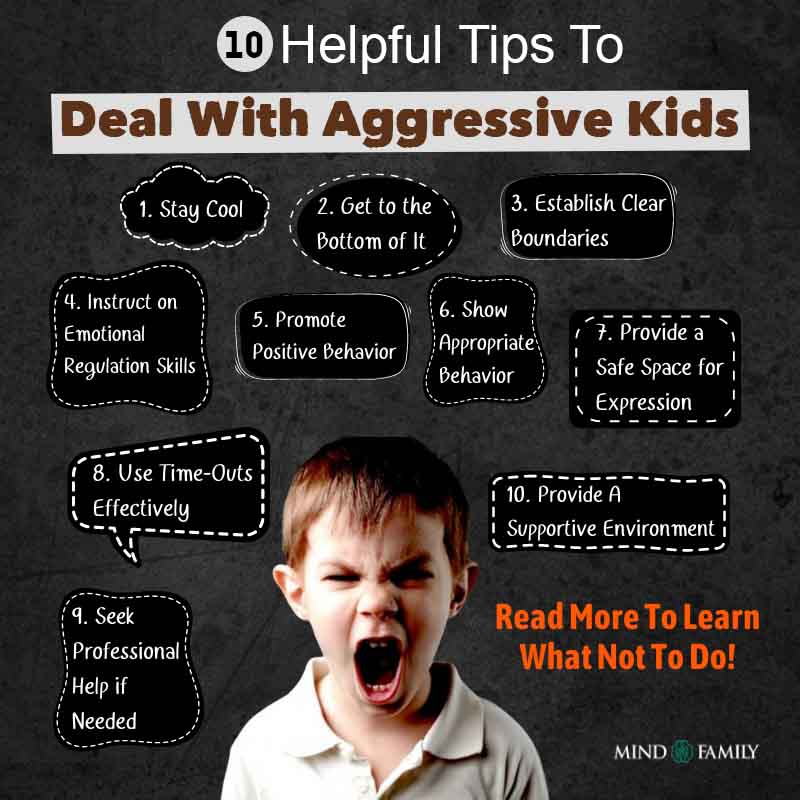
Below are 10 tips on how to deal with aggressive kids:
1. Stay Cool as a Cucumber
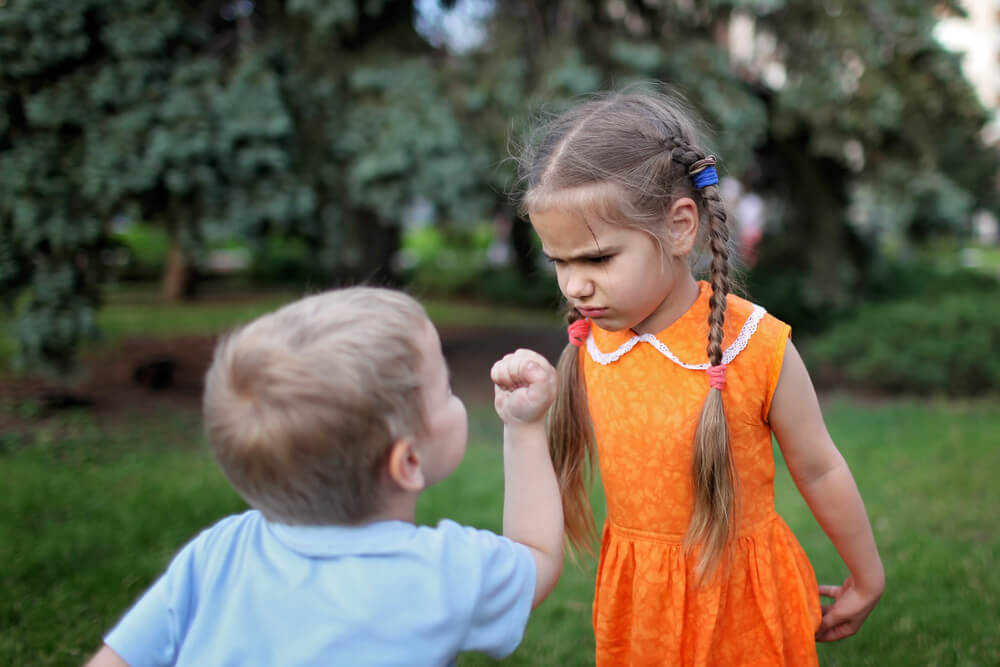
When kids get aggressive, it is important not to lose your cool. This significantly affects the course of things and how your child will react.
By being calm you are showing him that one can have control over emotions and this helps in calming him down.
One of the best ways how to deal with aggressive kids is to first breathe deeply, talk softly and slowly, do not act on impulse. Being composed can also make the child feel safe and less annoyed.
2. Get to the Bottom of It
Aggression in children often indicates deeper issues like frustration, worries, or being needy for attention. You should strive to understand why and when kids get aggressive to help him or her get through it.
Is it something they are dealing with at present? Did anything change recently about their environment or routine?
Identifying what has led to the problem is crucial for how to deal with aggressive kids as this will enable you to solve it more effectively and give the right support and intervention.
3. Establish Clear Boundaries That You Will Stick To
It may be hard for children to realize which acts are acceptable while others are simply not allowed by them hence even if they fight, we need them badly.
Making clear rules that apply consistently is crucial for how to deal with aggressive kids.
Make sure your child knows where he/she should “stop”, if otherwise happens then inform him/her about consequences naturally resulting from such actions.
By upholding these regulations uniformly, your child comes to an understanding of expectations placed upon him/her making them adhere on acceptable behavior guidelines all time long.
4. Instruct on Emotional Regulation Skills
When your child understands how to control their emotions, there will be less aggression by them. For example, when they feel overwhelmed, make them aware of such tactics as deep breathing, counting to ten, and taking a break.
Practice these skills together through role-playing so that they can be applied effectively in real-life situations. With this proactive approach to how to deal with aggressive kids, children are provided with the necessary tools for handling their emotions more healthily.
5. Promote Positive Behavior

One of the best ways for how to deal with aggressive kids is by reinforcing and praising it. At least acknowledge it or reward them when your child handles their emotions well or solves conflicts peacefully.
Positive reinforcement enables your child to grasp why behaving properly is beneficial and thereby encourages him/her to keep doing so.
Equally important, even minor successes can enhance self-esteem in addition to promoting positive behavioral trends.
6. Show Appropriate Behavior
Children usually copy what adults do around them. So when kids get aggressive the immediate actions that you show are the actions they will model.
Demonstrate how anger and frustration can be dealt with positively and constructively thereby being a good role model. Role modeling is crucial not only for how to deal with aggressive kids but also for raising holistic children.
Teach them effective communication strategies as well as ways of conflict resolution without having recourse to violence.
Being a good example through this manner of dealing with your feelings helps your child learn positive ways of managing his/her emotions from the inside out!
7. Provide a Safe Space for Expression
Creating a safe and supportive environment where your child feels comfortable expressing their feelings is crucial. Sometimes, aggressive behavior stems from a lack of outlets for their emotions.
Encourage your child to talk about their feelings openly and provide activities that allow them to express themselves creatively, such as drawing, writing, or playing music. This safe space helps them process their emotions and reduces the likelihood of aggressive outbursts.
8. Use Time-Outs Effectively
Time-outs can be an effective tool for how to deal with aggressive kids and allow them to reflect on their behavior. When implementing a time-out, ensure it is brief and appropriate for your child’s age and developmental stage.
Clearly explain why they are being given a time-out and what behavior needs to be addressed. A well-managed time-out can provide your child with an opportunity to cool down and reconsider their actions.
9. Seek Professional Help if Needed
If your child’s aggression is severe or persistent, it may be beneficial to seek help from a professional. A child psychologist or counselor is helpful how to deal with aggressive kids if you want a more effective approach.
Professional guidance can provide you with additional tools and techniques for managing aggression and offer support for both you and your child throughout the process.
10. Supportive Environment Promotion
For your child to be emotionally healthy, it is important to establish a supportive and caring home environment. Make sure you maintain open communication channels with the child that give them a sense of protection and empathy.
This is because when a strong positive bond exists between you as parents or guardians and your child, he/she feels valued; hence becoming less prone to aggression.
In addition, ensure that your house is one in which they can speak their minds openly while receiving needed assistance for their progress.
What Not To Do When Kids Get Aggressive?
Certain reactions or approaches can exacerbate the situation and negatively impact your child’s emotional development. In order to learn how to deal with aggressive kids you also have to understand what not to do when kids get aggressive.
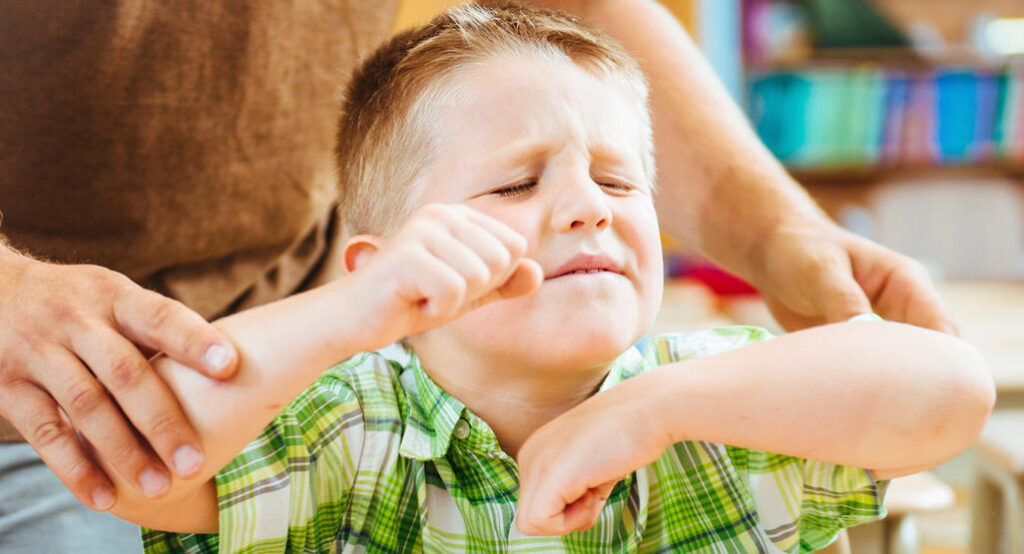
Here are key things to avoid when kids get aggressive:
1. Never React in Aggression
Sometimes, when people are provoked, they could respond with anger or irritation. However, responding aggressively does nothing to improve the situation; instead, it serves as a bad example and makes things worse.
Instead of shouting or applying corporal punishment: maintain your cool. Your response must seek to mitigate not heighten aggression.
2. Avoid Failing To Respond To The Behavior
Disregarding aggressive behavior with the expectation that it will die out on its own is unproductive. It is important to handle aggression directly while understanding why this happens.
By ignoring the behavior, it may become more deeply entrenched or happen more frequently because the child will not have learned how to properly manage their emotions or understand the consequences of their actions.
3. No Physical Punishments Should Be Used
Meanwhile, physical punishments like spanking or hitting do not help improve such behaviors.
This can increase aggressiveness, spoil the parent-child relationship, and cause long-term emotional and behavioral problems.
So rather than this one should look into ways of shaping positive discipline skills for children that would impart appropriate emotional management techniques to them too.
4. Do Not Give Empty Promises
It is important to keep one’s word and act when necessary because empty threats will undermine your control over the child and mix up his understanding of the boundaries and consequences.
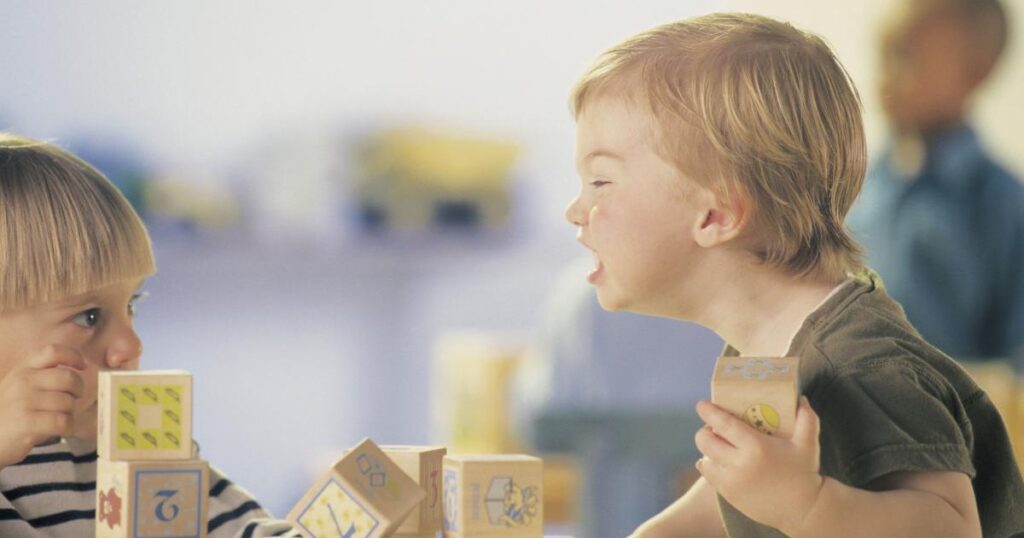
Empty threats can lead to the erosion of trust and respect which makes it harder to manage aggressive behavior properly.
5. Don’t Make Comparisons with Others
Comparing their behaviors with those of their siblings or peers can be harmful and counterproductive.
This can result into a sense of inadequacy, bitterness, more aggression etc as opposed to looking at specific behavior patterns of individual children while helping them improve emotional regulation.
6. Avoid Public Shaming
Addressing aggressive behavior in public can embarrass your child and damage their self-esteem.
Public shaming always heightens our feeling of shamefulness towards our selves in addition to making us more frustrated about things we do not want to see happening any longer.
Therefore, the best way how to deal with aggressive kids is to do it privately so that your child feels safe, secure, and respected while addressing their behavior.
7. Do Not Ignore Emotional Needs Of Your Child
Aggressive behavior may often indicate a lack of emotional needs or other underlying problems. Ignoring such needs so that only the behavior but not its emotional context is treated may cause great harm.
Ensure that you offer emotional support emotionally by; taking time to listen to your child has concerns and then look at what issues are involved in their aggression.
Understanding some things you should not do when dealing with aggression helps create a positive and supportive environment for a child.
By avoiding these pitfalls, you can adopt a more constructive approach towards aggression as well as help develop healthier emotional responses among kids.
A Word From Mind Family
Navigating your child’s aggressive behavior can be a daunting journey, but with the right approach and understanding, you can turn these challenges into opportunities for growth and development.
At Mind Family, we recognize that every child is unique, and there is no one-size-fits-all solution to managing aggression.
Remember, patience and consistency are crucial when learning how to deal with aggressive kids.
Each child develops at their own pace, and progress may come in small, incremental steps. Embrace the journey with empathy and perseverance, and seek support when needed.
Your efforts and dedication are making a significant impact, and together, we can support our children in building a healthier and more harmonious future.
Frequently Asked Questions (FAQs)
How to deal with aggressive kids?
Stay calm, understand the root cause, set clear boundaries, teach emotional regulation, encourage positive behavior, model appropriate behavior, provide a safe space for expression, use time-outs, seek professional help if needed, and foster a supportive environment.
What not to do when kids get aggressive?
Don’t react with aggression, ignore the behavior, use physical punishment, make empty threats, compare your child to others, use public shaming, or neglect your child’s emotional needs.
Why do you need to deal with aggressive kids early?
Addressing aggressive behavior early prevents it from becoming entrenched, promotes healthier emotional development, and helps your child learn effective coping strategies before patterns become more difficult to change.
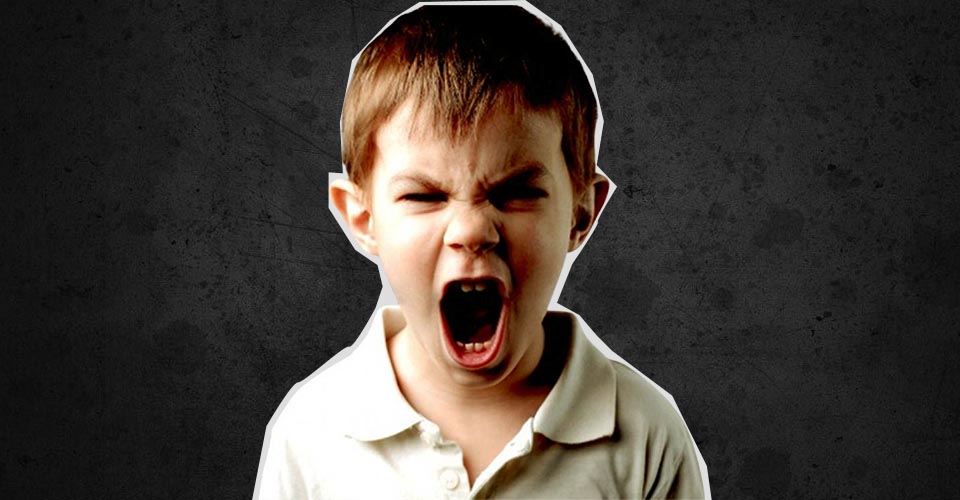








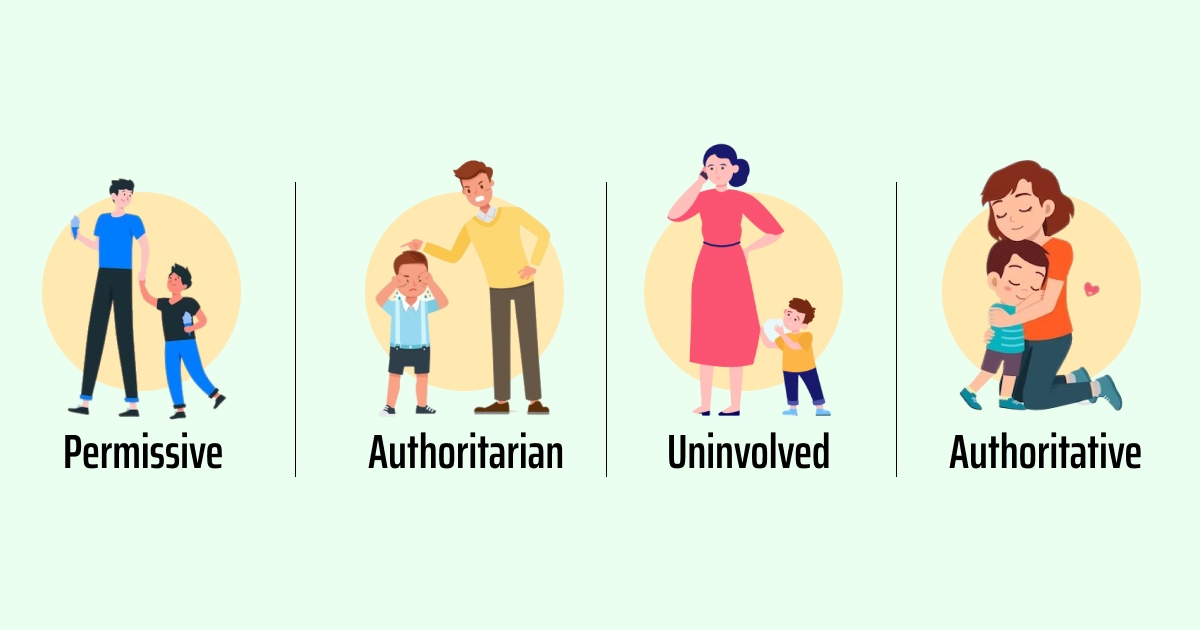








Leave a Reply